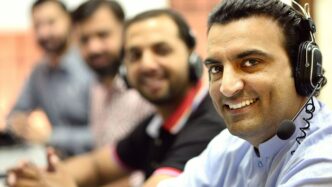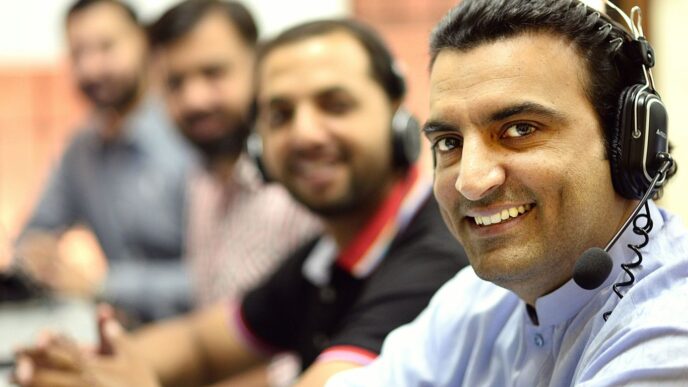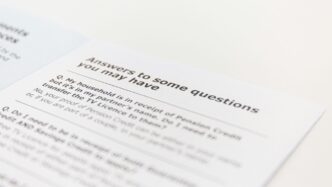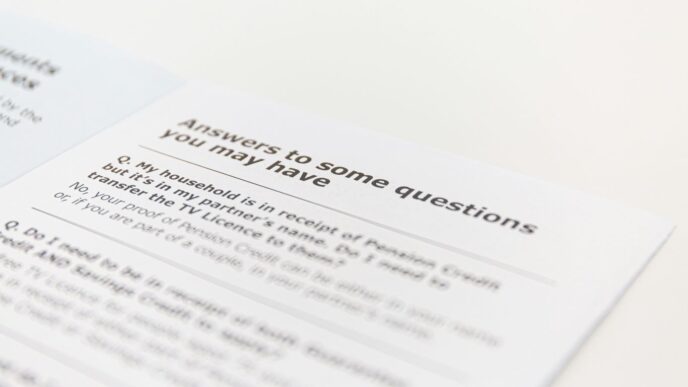Getting ready for your first job interview can feel like a big deal. You’re excited, maybe a little nervous, and you really want to make a good impression. It’s totally normal to feel a bit anxious, but with some solid preparation, you can walk in feeling much more sure of yourself. These interview tips for beginners are here to help you get ready, show what you’re made of, and hopefully land that job.
Key Takeaways
- Do your homework on the company and really look at the job description. Figure out what they need and how you fit in.
- Practice answering common interview questions out loud. Use real examples from your life to back up what you say.
- Plan what you’ll wear and get to the interview location a bit early. Bring copies of your resume and anything else you might need.
- Pay attention to how you sit and act during the interview. Listen well and try to show you’re interested and confident.
- Always send a thank-you note after the interview and think about what went well and what you could do better next time.
Mastering Pre-Interview Preparation
Getting ready for your first job interview can feel like a big deal, and honestly, it is! But don’t let the nerves get the best of you. A little bit of prep work goes a long way in making you feel more confident and ready to show them what you’ve got. The goal here is to walk in knowing you’ve done your homework.
Thorough Company Research
Before you even think about what you’ll wear, spend some time digging into the company. Check out their website – what’s their mission? What kind of projects are they working on lately? Look for recent news or blog posts. If you’re applying to a marketing firm, see what their latest campaigns look like. Mentioning something specific you found, like "I saw your recent campaign for X product, and I thought it was really creative," shows you’re genuinely interested and not just sending out resumes blindly. It helps you connect what you can do with what they need.
Deconstruct The Job Description
Go back to that job posting you applied for. Read it carefully, line by line. What skills are they asking for? What are the main duties? Think about your own experiences – school projects, volunteer work, previous jobs, even hobbies – and how they match up. For example, if the description says they need someone with "good organizational skills," think of a time you managed a group project, kept track of tasks, and met a deadline. Being able to point to a specific instance makes your skills much more believable.
Understand Your Unique Value
So, you’ve researched the company and broken down the job description. Now, think about what makes you a good fit. What are your strongest skills? What experiences do you have that are relevant? It’s not just about listing things; it’s about connecting them. Why are you the right person for this specific job at this particular company? Think about your "story" – how your background, your interests, and your abilities all come together to make you a strong candidate. This self-awareness will help you answer questions more confidently and show them why they should hire you.
Crafting Compelling Answers

This is where you get to show them what you’re made of. It’s not just about having the right skills; it’s about explaining how those skills fit the job and why you’re the person for it. Think of this part as telling your story, but with a specific goal in mind.
Practice Common Interview Questions
Let’s be real, some questions pop up a lot. Knowing them beforehand is half the battle. You’ll want to have solid answers ready for things like:
- "Tell me about yourself."
- "Why are you interested in this role?"
- "What are your strengths and weaknesses?"
- "Where do you see yourself in five years?"
It’s not enough to just have the answers in your head, though. You’ve got to say them out loud. Try doing a practice run with a friend, or even just in front of a mirror. It feels a bit silly at first, but it really helps you smooth out your delivery and make sure you’re not rambling.
Back Up Answers With Real Examples
Anyone can say they’re a "team player" or "good under pressure." But what makes your answer stick is when you can point to a time you actually were those things. Think about specific situations from school projects, past jobs, or even volunteer work. What was the challenge? What did you do? What was the result? Using the STAR method (Situation, Task, Action, Result) can be a really helpful way to structure these stories. For instance, if asked about handling a difficult situation, you could describe the problem, your specific role, the steps you took, and what happened because of your actions. This makes your claims believable and shows you can apply your skills.
Articulate Strengths and Weaknesses Effectively
When they ask about your strengths, connect them directly to the job description. Don’t just list them; explain how that strength would help you succeed in this particular role. For weaknesses, avoid clichés like "I work too hard." Instead, pick a genuine area for improvement and, importantly, explain what you’re doing to address it. For example, you might say, "I used to struggle with public speaking, but I’ve been actively seeking opportunities to present in group settings and have even taken an online course to build my confidence. I’m seeing real improvement and feel much more comfortable now."
Making A Strong First Impression

Okay, so you’ve prepped like a champ, and now it’s interview day. This is where all that hard work starts to pay off, and honestly, how you show up matters. It’s not just about what you say, but how you present yourself from the moment you walk in (or log on!).
Dress Appropriately For The Role
Think of your outfit as your opening statement before you even say hello. It tells the interviewer you’re serious about this opportunity. While some places are super casual, it’s almost always better to be a little overdressed than underdressed. For most interviews, aiming for business casual is a safe bet. This usually means clean, pressed slacks or a skirt, a nice blouse or collared shirt, and maybe a blazer or cardigan if you have one. Avoid anything too flashy, too tight, or too revealing. If you’re really unsure, a quick look at the company’s social media or website might give you clues about their vibe. When in doubt, ask the recruiter or HR contact – they’d rather you ask than show up in jeans when everyone else is in suits.
Arrive Punctually
Being on time is non-negotiable. It shows you respect their time and that you’re reliable. If the interview is in person, try to get there about 10-15 minutes early. This gives you a buffer for unexpected traffic, parking issues, or just a moment to collect yourself. If it’s a virtual interview, log in a few minutes early to make sure your tech is working. There’s nothing worse than scrambling to find the right link or troubleshoot your camera when you’re supposed to be starting.
Prepare Essential Materials
Don’t let a forgotten item derail your confidence. Before you head out or log on, do a quick check to make sure you have everything you need. This typically includes:
- Copies of your resume: Even if they have it, it’s good to have a few clean, printed copies on hand.
- A notepad and pen: For jotting down important points or questions you think of during the conversation.
- A list of your prepared questions: So you don’t forget what you wanted to ask.
- Portfolio or work samples (if applicable): If the role requires it, have these ready to show.
- Identification: If you’re going to a physical office, you might need it to get past security.
Having these items ready shows you’re organized and thoughtful. It’s one less thing to worry about, letting you focus on the conversation itself.
Navigating The Interview Itself
Okay, so you’ve prepped like a champ and you’re ready to go. Now comes the actual interview. This is where you show them who you are, beyond the resume. It’s not just about what you say, but how you present yourself.
Mind Your Body Language
Think about how you’re sitting and what your hands are doing. When you’re nervous, it’s easy to start fidgeting, biting your nails, or playing with your hair. Try to sit up straight, keep your hands relaxed in your lap, and make eye contact. A good handshake, if offered, can set a positive tone right away. Leaning in a little when the interviewer is talking shows you’re paying attention. If you know you tend to do a certain nervous habit, try to catch yourself before it happens. A little practice beforehand, maybe in front of a mirror, can help you feel more comfortable.
Listen Attentively And Answer Thoughtfully
It sounds simple, but when you’re under pressure, it’s easy to jump in with an answer before you’ve fully heard the question. Take a breath. If you need a second to gather your thoughts, it’s totally fine to say something like, "That’s a good question, let me think about that for a moment." This shows you’re not just reacting, but you’re considering what’s being asked. When you do answer, try to be clear and direct. If they ask for an example, give a specific one from your past experiences. It makes your answer much more believable.
Show Enthusiasm And Confidence
Nerves are normal, everyone gets them! The trick is to turn that nervous energy into excitement about the job. Let them see you’re genuinely interested in the role and the company. If there’s something you don’t have direct experience with, don’t panic. Instead, focus on how your other skills can help you learn quickly. For instance, if they ask about a software you haven’t used, you could mention how you picked up a similar tool quickly in a previous role and are confident you can do the same here. Showing you’re eager and capable goes a long way.
Asking Insightful Questions
Interviews aren’t just about them getting to know you; it’s also your chance to check them out. Seriously, it’s a two-way street. You want to make sure this place is a good fit for you too, right? So, when they ask, "Do you have any questions for us?" – and they almost always do – don’t just say "Nope, I’m good." That’s a missed opportunity.
Prepare Questions In Advance
Before you even walk in the door (or log into the video call), have a few questions ready. Think about what you really want to know. It shows you’ve put thought into this and aren’t just winging it. Jot them down on a notepad or your phone so you don’t forget.
Focus On Company Culture And Role Success
Instead of asking super generic stuff like "What’s the day-to-day like?" (which you can often figure out from the job description anyway), try to dig a little deeper. Ask things that show you’re thinking about contributing and fitting in.
Here are some ideas:
- What does success look like in this role after, say, six months?
- How does the team usually handle projects that have tight deadlines?
- What are some of the biggest challenges the team or department is facing right now?
- Can you describe the team’s working style? Are people more independent or collaborative?
Asking about challenges or how the team works shows you’re thinking about real-world scenarios and how you’d fit into the workflow.
Demonstrate Genuine Interest
Your questions should make it clear you’re not just looking for any job, but this job. If you learned something specific about the company during your research – maybe a recent project or a company value that stood out – try to weave that into a question. For example, "I read about your recent initiative in X area; how does this role contribute to that goal?" This kind of question shows you’ve done your homework and are genuinely excited about their work. It’s way better than just asking what the coffee machine is like.
The Crucial Post-Interview Follow-Up
So, you’ve made it through the interview. Nice job! But don’t pack your bags just yet. The interview isn’t truly over until you’ve done a little bit of follow-up. It might seem like a small thing, but it can really make a difference in how the hiring team sees you.
Send A Timely Thank-You Note
Seriously, don’t skip this step. Within 24 hours of your interview, send a thank-you email. It’s a chance to say thanks for their time, of course, but also to briefly remind them why you’re a good fit. You can mention something specific you talked about that excited you, or just reiterate your interest in the role. A quick, personalized note shows you’re thoughtful and still keen on the job. It doesn’t need to be long, just sincere.
Offer References Proactively
Have a list of people who can vouch for your skills and work ethic ready to go. These could be former supervisors, professors, or even colleagues. It’s a good idea to let these people know you’ve interviewed for a position and that a potential employer might be reaching out. This way, they’re prepared and can give you a good recommendation when the time comes. It shows you’re organized and have people who believe in you.
Reflect And Learn From The Experience
Every interview is a learning opportunity, even if you don’t get the job. Think back on how it went. What questions did you nail? What could you have answered better? Were there any moments you felt unsure? Jotting down these thoughts can help you prepare for your next interview. If you can, ask for feedback – some companies are willing to share what they liked and what could be improved. Taking the time to reflect helps you grow and get better each time.
Wrapping It Up
So, you’ve prepped, you’ve practiced, and you’ve thought about what to wear. That first job interview is a big deal, no doubt about it. But remember, it’s not about being perfect. It’s about showing them you’re ready to learn, you’ve got some good skills, and you’re genuinely interested in the job. Take a deep breath, be yourself, and trust that all the work you put in will help you make a solid impression. You’ve got this!
Frequently Asked Questions
What should I wear to my first interview?
It’s best to dress a little nicer than you think you need to. Think neat and clean! For most jobs, smart casual or business attire is a good choice. This means things like a collared shirt, nice pants or a skirt, and maybe a jacket. Avoid anything too flashy or too relaxed, like ripped jeans or t-shirts with big logos. You want to show you respect the opportunity.
How early should I arrive for an interview?
Plan to get there about 15 minutes before your interview starts. This gives you time to find the place, park, and take a moment to relax and collect your thoughts. Arriving on time shows that you’re reliable and serious about the job.
What should I bring with me to the interview?
Definitely bring a few copies of your resume, even if they already have it. It’s also a good idea to bring a notebook and pen to jot down important information. If you have any work samples, like a drawing or a piece you wrote, bring those too. Make sure your phone is turned off or on silent!
How can I answer questions about my weaknesses?
Instead of saying something general like ‘I’m a perfectionist,’ it’s better to talk about a real challenge you’ve worked on. For example, you could say, ‘I used to struggle with managing my time when I had a lot of schoolwork. But I learned to use a planner and break down tasks, which really helped me stay organized. Now I’m much better at handling my workload.’
What if I don’t know the answer to a question?
It’s okay to pause and think before you answer! You can even say, ‘That’s a good question, let me think about that for a moment.’ If you don’t have direct experience with something they ask about, focus on skills you do have that can help you learn quickly. For example, ‘I haven’t used that specific software before, but I learned a similar program quickly in my last project, and I’m confident I can pick this one up fast.’
Should I ask questions at the end of the interview?
Yes, absolutely! Asking questions shows you’re interested and have been paying attention. Instead of asking very basic questions, try to ask things like, ‘What does a typical day look like in this role?’ or ‘What are the biggest challenges someone in this position might face?’ or ‘What do you enjoy most about working here?’














